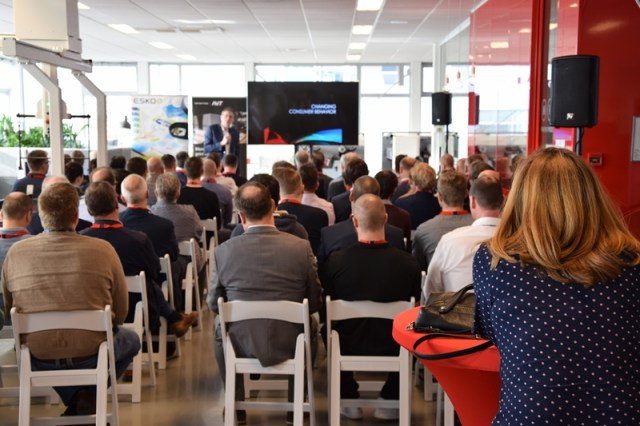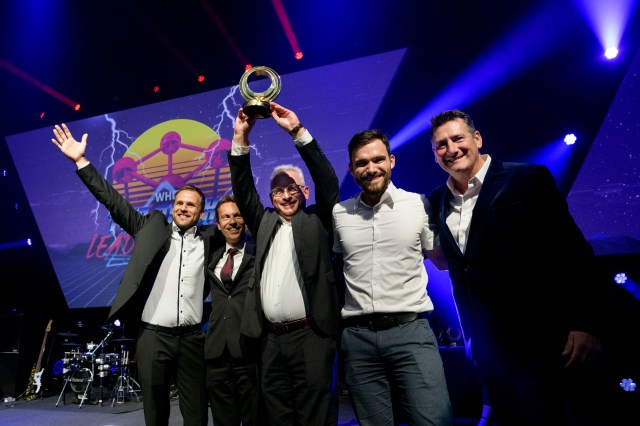
This article first appeared in the April 2025 issue of ProPack.pro magazine
One of the sessions from the recent FINAT European Label Forum centered on label leadership, providing an in-depth exploration of effective leadership strategies within the label industry.
The session featured a panel discussion with label industry leaders and a closing keynote by Olympic gold medalist and coach Tim Foster.
The panel, comprising of Laura Bas (Gen Z expert and former UN Youth Ambassador), Tom Baker (Baker Labels, UK), Dana Kilarska (Purgina Labels, Slovakia), Iban Cid (Germark), and Anastasios Politis
(IC – International Circle of Educational Institutes of Graphic Media Technology and Management, Greece), tackled critical challenges in attracting and retaining talent while emphasising the unique aspects of leadership within the label sector.
One recurring theme was the pressing need to attract younger generations to the industry. Panelists acknowledged that the label industry often struggles with its image as “not sexy”. However, the consensus was clear: rebranding the sector to highlight its innovation, sustainability efforts, and impact on everyday life is essential.
Suggestions included:
- Enhancing employer branding: Creating authentic narratives around the industry’s contributions to sustainability and innovation. Using digital platforms, companies can showcase how their work impacts global supply chains and consumer experiences.
- Engaging Gen Z and Millennials: As younger generations value purpose- driven work, collaboration, and continuous learning, fostering an inclusive and adaptive workplace culture can better resonate with these demographics.
- Educational partnerships: Some companies successfully collaborate with educational institutions, so programmes such as internships, apprenticeships, and job rotations are effective in attracting and developing young professionals.
Panelists agreed leadership in the label industry must evolve to meet the expectations of a diverse workforce.
The panel stressed the importance of:
- Intergenerational collaboration: Pairing experienced employees with younger professionals fosters mutual learning and innovation. Mentorship programmes that encourage two-way knowledge sharing are highly effective.
- Flexibility and autonomy: Empowering employees with flexible work arrangements and opportunities for creative problem-solving aligns with the values of younger generations.
- Positive workplace culture: Leaders discussed how trust, empathy, and transparency form the foundation of a productive and engaged workforce. They also emphasised creating a culture where feedback is constructive and actionable.
Foster’s keynote on leadership offered parallels for label industry leaders aiming to guide their teams effectively. He used the analogy of his Olympic rowing team to illustrate the following principles:
- Trust as a foundation: A successful team begins with trust in individual expertise. Foster described how each rower brought unique strengths to the boat, emphasising the importance of recognising and leveraging individual contributions.
- Constructive conflict: Foster highlighted how his team embraced open and honest communication. After a rare defeat before the Sydney Olympics, the team held a candid discussion where every member took personal accountability and identified areas for improvement. This meeting transformed their approach, ultimately leading to their gold medal win.
- Commitment and accountability: Foster stressed the importance of shared goals and relentless effort. His team’s mantra, “Will it make the boat go faster?” served as a guiding principle for decision-making and action, ensuring alignment with their ultimate objective.
- Adapting leadership styles: As a coach, Foster learned that effective leadership requires understanding and addressing the unique motivations of team members. He stressed the need for leaders to balance technical expertise with emotional intelligence to inspire their teams.
Foster also drew direct connections between sports and business leadership:
– Set ambitious but clear goals: Just as his team aimed to surpass the world record, businesses should define measurable, ambitious targets to drive performance.
– Foster team resilience: Challenges and setbacks are opportunities for growth. Leaders should cultivate a culture where teams view failures as stepping stones to success.
– Promote continuous improvement: Foster described how his team’s training regime involved constant evaluation and refinement. Similarly, businesses must invest in upskilling and innovation to stay competitive.
For label industry leaders, the key takeaway was clear: the future lies in building inclusive, dynamic, and innovative organisations that inspire employees and embrace change.


